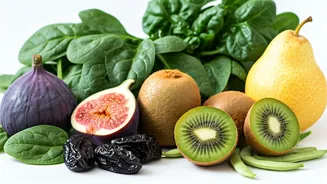Introduction: The Problem
Constipation, a common ailment, affects people of all ages and backgrounds. It's often characterized by infrequent bowel movements or difficulty passing
stools, leading to discomfort and other health issues. While there are various treatments available, dietary changes offer a natural and effective approach to managing and alleviating constipation. This article will explore a curated list of ten foods, recommended by a Harvard-trained gastroenterologist, renowned for their ability to promote regular bowel movements and improve overall digestive health. By understanding the properties of these foods and how they affect the body, individuals can take proactive steps to support their digestive function and enjoy greater comfort and well-being.
Fiber-Rich Flax Seeds
Flax seeds are a powerhouse of soluble and insoluble fiber, both crucial for digestive health. Soluble fiber absorbs water, adding bulk to the stool, making it easier to pass, while insoluble fiber adds bulk and promotes movement through the intestines. Incorporating flax seeds into your diet can be as simple as adding a tablespoon to your morning cereal, yogurt, or smoothies. It is important to begin with a small serving, as increasing fiber intake too quickly can lead to gas and bloating. Remember to drink plenty of water when consuming flax seeds to aid in their effectiveness and avoid any potential discomfort. The benefits of flax seeds extend beyond just easing constipation, as they also provide omega-3 fatty acids, which are beneficial for heart health and reduce inflammation.
Kiwi: The Digestive Wonder
Kiwis are another excellent choice for constipation relief, due to their high fiber content and unique enzymes that support digestion. Kiwis contain actinidin, an enzyme that helps break down proteins and speeds up the digestion process, thus promoting regular bowel movements. This fruit offers a good source of both soluble and insoluble fiber, adding bulk to the stool and easing its passage through the digestive system. Kiwis are also packed with vitamins and antioxidants, contributing to overall health. Enjoying one or two kiwis a day can often provide noticeable relief, either as a snack or added to other meals. Kiwis can be eaten plain or blended into smoothies, making them a versatile and tasty addition to a constipation-relieving diet. Their natural laxative properties make them a useful and pleasant remedy.
Oats: Gentle Bulk Provider
Oats are well-known for their soluble fiber, specifically beta-glucan, which absorbs water in the gut and forms a gel-like substance. This process softens the stool and makes it easier to pass. Oats are a staple in many cultures and can be prepared in various ways, such as oatmeal, overnight oats, or added to baked goods. They're a versatile breakfast option and a convenient way to boost fiber intake. Oats also offer sustained energy release, making them an excellent choice for a filling and satisfying meal. Starting your day with a bowl of oatmeal can help regulate bowel movements and keep your digestive system functioning smoothly. The inclusion of oats in the diet supports both immediate relief and long-term digestive health benefits.
Papaya: Digestive Enzyme Power
Papaya is a tropical fruit that contains an enzyme called papain, known for its ability to break down proteins and improve digestion. This enzyme helps in breaking down food, reducing the likelihood of constipation. Eating papaya can therefore assist in easing discomfort and promoting regular bowel movements. In addition to papain, papayas are rich in fiber and water, both crucial for preventing constipation. The fiber adds bulk to the stool, facilitating its passage through the intestines, while water helps keep the stool soft and manageable. Papaya can be eaten fresh as a snack, added to smoothies, or incorporated into salads. It can be a tasty and effective remedy for those struggling with constipation. Regular consumption can support smoother and more frequent bowel movements.
Pears: Sweet and Fiber-Rich
Pears are a good source of fiber, providing both soluble and insoluble fiber, which contributes to the relief of constipation. The fiber adds bulk to the stool and stimulates bowel movements, easing constipation. Pears are also naturally sweet, making them a delicious and healthy choice for people looking to improve their digestion. They can be enjoyed as a snack, added to salads, or cooked in various recipes. The high water content in pears also contributes to keeping the stool soft and easier to pass. Eating pears regularly can help regulate bowel movements and enhance overall digestive health. The combination of fiber, water, and sweetness makes pears a delightful and useful addition to a diet focused on alleviating constipation.
Prunes: Natural Remedy Savior
Prunes are well-recognized for their effectiveness in treating constipation, largely due to their high fiber content and natural sugars, which have a mild laxative effect. Prunes contain both soluble and insoluble fiber, providing bulk and stimulating bowel movements. Additionally, prunes contain sorbitol, a sugar alcohol that draws water into the intestines, softening the stool and promoting easier passage. Prunes can be eaten alone as a snack or added to other meals, such as cereals or yogurt. While effective, it's essential to consume prunes in moderation, as excessive intake can lead to gas or bloating. Prunes offer a natural, convenient, and effective way to relieve constipation, contributing significantly to improved digestive health.
Sweet Potato: Fiber-Packed Option
Sweet potatoes are an excellent source of fiber and, therefore, beneficial for preventing and relieving constipation. Fiber adds bulk to the stool, promoting more regular bowel movements. Sweet potatoes are also rich in nutrients, including vitamins A and C, and antioxidants, contributing to overall health. They can be prepared in various ways, such as roasted, baked, or boiled, making them a versatile addition to any diet. Choosing sweet potatoes over other carbohydrate sources can provide a tasty and healthful way to support digestion and alleviate constipation symptoms. Eating sweet potatoes regularly can help ensure consistent and comfortable bowel movements, enhancing overall well-being. They provide significant dietary fiber while offering a rich source of essential nutrients.
Chia Seeds: Small Seed, Big Impact
Chia seeds are tiny, but packed with fiber, making them an effective tool for preventing and relieving constipation. Chia seeds are a rich source of both soluble and insoluble fiber, which promotes regular bowel movements. When chia seeds come into contact with water, they expand, creating a gel-like substance that adds bulk to the stool and helps ease its passage. Adding chia seeds to your diet is easy; they can be sprinkled on cereal, yogurt, or added to smoothies and baked goods. They can also be soaked in water or plant-based milk to form a pudding. Consuming chia seeds is a simple way to increase your fiber intake and support healthy digestion. Their high fiber content, along with their versatility, makes chia seeds a great addition to any diet.
Spinach: Green for Goodness
Spinach, a leafy green vegetable, is an excellent source of fiber and also a good choice for relieving constipation. The fiber content in spinach helps add bulk to the stool and encourages the movement of waste through the digestive system. Spinach also contains magnesium, which helps relax the intestinal muscles, making it easier to pass stools. Spinach can be enjoyed in salads, cooked as a side dish, or added to smoothies. Its versatility makes it easy to incorporate into your daily meals. By including spinach in your diet regularly, you can improve your digestive health and relieve constipation symptoms. The combination of fiber and magnesium makes spinach an effective and beneficial food for digestive wellness.



















